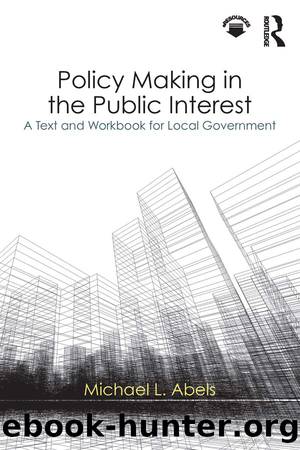Policy Making in the Public Interest: A Text and Workbook for Local Government by Michael L. Abels

Author:Michael L. Abels [Abels, Michael L.]
Language: eng
Format: epub
Tags: Public Policy, General, Political Science, American Government, Local
ISBN: 9781351661737
Google: rOI2DwAAQBAJ
Goodreads: 36761312
Publisher: Routledge
Published: 2017-09-22T00:00:00+00:00
Deliberative Processes for Citizen Engagement
As a critical part of the environmental scan, policy makers need to survey the needs and program/service priorities of their citizens, and to encourage active citizen involvement in setting and prioritizing strategies and goals. Citizens need to be involved both directly and indirectly as participants in all stages of the plan development. Involvement should be direct through deliberative processes, and indirect through interaction that is facilitated by electronic forms of participation. One cannot supplant the other.
Essential and continual public involvement in the strategic planning process may take the direct form of formal public meetings, with informal electronic participation made possible through many available platforms, an example being the program Mindmixer. Direct and indirect involvement will permit all segments of the community to have an avenue for contributing to all outputs of the planning process, thus gaining ownership of the final plan. It is safe to say that such involvement will require that additional time and resources be allotted to the planning process. Citizen and stakeholder ownership is more important than speed of product development. While building time into the process seems counterintuitive with what has been described as citizens demanding immediate resolution of demands, managers and elected officials must invest time to educate their community about the necessity for civitas, or engaging citizens in building social capital. By doing so, an invaluable political value will be created, one of creating a shared responsibility to a common purpose and, on a larger scale, instilling a shared sense of community (Arrington 2017).
It is important that local government also modify the current process used to generate public input for policy actions that are under current consideration by the legislative body. Most local governments permit citizen participation through public input at meetings of the legislative body after the policy action has been drafted by staff, and presented to the legislative body for adoption. Asking for citizen review after the policy alternative has been formulated creates disillusionment among those citizens concerned about, and who desire engagement with, the policy issue. Citizens restricted to input opportunities after a policy action has been drafted perceive their ideas for policy alternatives as meaningless. The alienation caused by our current form of reactionary citizen input is largely responsible for the âNIMBY,â not in my back yard, and the âCAVE,â citizens against virtually everything, response that dominates many of our current public hearings. The level of public distrust held by citizens toward government as well as public institutions in general requires that local government utilize a new public input format for policy development. The new system must see citizens assisting with the identification of the problem, and formulation of policy approach. Instead of just reacting to staff- and legislative-conceived approaches to community issues, citizens must be involved at the front end where the actual problems and possible solutions are identified and analyzed. As was discussed with the engagement of citizens in the strategic planning process, this system of public engagement will require that time to be added to the strategic planning and policy development process.
Download
This site does not store any files on its server. We only index and link to content provided by other sites. Please contact the content providers to delete copyright contents if any and email us, we'll remove relevant links or contents immediately.
The Secret History by Donna Tartt(19048)
The Social Justice Warrior Handbook by Lisa De Pasquale(12187)
Thirteen Reasons Why by Jay Asher(8893)
This Is How You Lose Her by Junot Diaz(6877)
Weapons of Math Destruction by Cathy O'Neil(6264)
Zero to One by Peter Thiel(5786)
Beartown by Fredrik Backman(5737)
The Myth of the Strong Leader by Archie Brown(5498)
The Fire Next Time by James Baldwin(5431)
How Democracies Die by Steven Levitsky & Daniel Ziblatt(5213)
Promise Me, Dad by Joe Biden(5141)
Stone's Rules by Roger Stone(5081)
A Higher Loyalty: Truth, Lies, and Leadership by James Comey(4951)
100 Deadly Skills by Clint Emerson(4920)
Rise and Kill First by Ronen Bergman(4779)
Secrecy World by Jake Bernstein(4740)
The David Icke Guide to the Global Conspiracy (and how to end it) by David Icke(4701)
The Farm by Tom Rob Smith(4502)
The Doomsday Machine by Daniel Ellsberg(4484)
